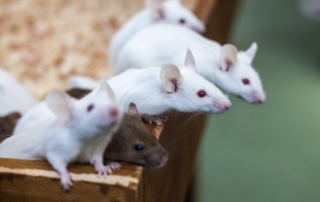A new study, performed by multiple independent scientific institutions around the world, has found that exposure to glyphosate-based herbicides (GBHs), including Roundup, caused reproductive and developmental effects in both male and female rats, at a dose level currently considered
Read More
Global Glyphosate Study Pilot Phase Shows Reproductive and Developmental Effects at ‘Safe’ Dose
Glyphosate is a Potential Hazard Factor for Coronary Artery Disease
Researchers from China have discovered that there is a likely link between Coronary Artery Disease (CAD) and exposure to glyphosate herbicides at work.
The association between coronary artery disease and glyphosate exposure found in pesticide factory workers
Authors:
Liping Pan, Ming Xu,
Read More
Glyphosate Breakdown Increases Problems of Algal Blooms
A new study from Canada finds that glyphosate breakdown releases phosphorus into water bodies in agricultural areas, contributing to the problem of eutrophication.
Eutrophication is the process whereby a body of water becomes overly enriched with minerals and nutrients, which
Read More
Glyphosate Herbicide Exposure Linked to Parkinson’s Disease
This new study from Washington State in the U.S. has revealed a link between premature mortality from Parkinson’s disease and exposure to glyphosate and paraquat.
Estimated residential exposure to agricultural chemicals and premature mortality by Parkinson’s disease in Washington state
Full
Read More
Glyphosate Based Herbicides are Genotoxic and Cytotoxic to Human Cells at Low Levels of Exposure
This new study from South Africa has shown that glyphosate and glyphosate-based herbicides are genotoxic and cytotoxic to human cells at the levels the human population is exposed to.
Moderate levels of glyphosate and its formulations vary in their cytotoxicity
Read More
Glyphosate is Genotoxic to Human White Blood Cells at Low Concentrations
A new study funded by the Italian Ministry of Education, Universities and Research has revealed that glyphosate is gentoxic to human lymphocyte cells, a subtype of white blood cells, at multiple low concentration doses under the current Acceptable Daily Intake
Read More
Glyphosate-Based Herbicides Cause Significant Changes in Rats’ Intestinal Microbiome
Rats treated with Glyphosate-based herbicides in this landmark study presented statistically significant changes of the intestinal microbiome in particular during development.
13-week pilot study on glyphosate and Roundup administered at human-equivalent dose to Sprague Dawley rats: effects on the microbiome
The
Read More
Glyphosate Herbicides Linked to Uterine Hyperplasia at Low Concentrations
A new study from Argentina, has shown that early postnatal exposure to low doses of a glyphosate-based herbicide enhances the sensitivity of the rat uterus to estradiol, and induces histomorphological and molecular changes associated with uterine hyperplasia.
Glyphosate-based herbicide enhances the
Read More
High Concentrations of Glyphosate Are Deleterious to Immature Bees
This new study from China has shown how honey bees’ microbiomes and larval survival rate and weight are negatively affected by glyphosate.
The Herbicide Glyphosate Negatively Affects Midgut Bacterial Communities and Survival of Honey Bee during Larvae Reared in Vitro
Final
Read More
GM Bt Toxin is Immunogenic, Allergenic, and Causes Pre-Cancerous Intestinal Changes
A new study performed in mice has found that the GM Bt toxin Cry1Ac is immunogenic, allergenic, and able to induce anaphylaxis (a severe allergic response that can result in suffocation). The responses that Cry1Ac was found to produce
Read More














